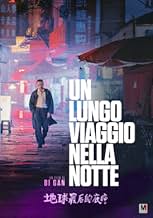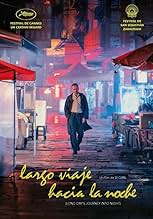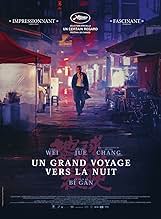VALUTAZIONE IMDb
7,1/10
10.041
LA TUA VALUTAZIONE
Luo Hongwu fa ritorno a Kaili, a 12 anni di distanza da una relazione che non è riuscito a dimenticare. Fa il possibile per ritrovare la donna e per ricostruire quanto è avvenuto, ma i suoi ... Leggi tuttoLuo Hongwu fa ritorno a Kaili, a 12 anni di distanza da una relazione che non è riuscito a dimenticare. Fa il possibile per ritrovare la donna e per ricostruire quanto è avvenuto, ma i suoi ricordi si mescolano alla sua immaginazione.Luo Hongwu fa ritorno a Kaili, a 12 anni di distanza da una relazione che non è riuscito a dimenticare. Fa il possibile per ritrovare la donna e per ricostruire quanto è avvenuto, ma i suoi ricordi si mescolano alla sua immaginazione.
- Premi
- 15 vittorie e 45 candidature totali
Ming-Dow
- Traffic Police
- (as Ming Dow)
Recensioni in evidenza
I had a hard time following the first half of the movie, it felt more like shattered memories than cohesive story/narrative. It felt to long although it had it's moments like the karaoke part... Then that one hour long take came and it blew me away. The camerawork and visuals in this movie are astonishing, it added to that hypnotizing feeling of the whole movie. With few rewatched the rating might go up!
An unexpected gem, reminded me of early Wim Wenders or Jadorowsky. Obviously it's not a linear plot set in everyday reality, something that some reviewers seem to have not understood. It's metaphysical references resonate more and more strongly - mortality and transience, love and loss. It's disconcerting and haunting, very original.
Everyone reading this review, please forgive me for my perhaps strange sounding english, I'm from and currently lives in China.
I saw this film today at a Local Cinema, in Dongguan, I must say I feel very fortunate having seen this, and also Jia Zhang Ke's "Ash is the Purest White" in Cinema, normally in China, we only screen Popcorn Films, but never Art films. I heard about Longest Day's Journey into the night a long time ago, when I found out this Chinese movie was competing for 2018's Cannes Un Certain Regard! By the way, the chinese name of the film, "di qiu zui hou de ye wan", actually means Earth's Last Night, or Last Night on Earth, what an awesome name!
Words cannot describe what this movie is like, or how awesome it is, At least this is so for me, I simply cannot do it with words, but I believe this actually proves how good this movie is, since if words can describe it, it wouldn't have accomplished its goal, the goal of motion picture, as a medium of art, is to express something that language cannot express, just like Beethoven's Symphonies, or Monet's paintings.
Many People won't understand this movie, because they're not Chinese, they don't understand how the subtle details in this movie reminds us of our country, and even if chinese audiences are watching it, like the few that watched it with me tonight, won't get it, because most Chinese people have almost no exposure to Art House Cinema, they usually watch 3 types of movies, Hollywood Action Flicks, Romantic Comedy, or Horror, that's it.
The Film Score in this movie is also awesome, Bela Bartok wanted to write Hungarian Themed Muisc in the western classical fasion, the soundtrack in this movie is somewhat like Bartok's, they have the same goal, this movie's music comprise of Electronic Music featuring themes in the style of music from China's minor ethnic cultures, this, plus the hour long single take dream sequence, make this film so rare a work of art, that it deserves to be charished.
Despite the dream-like scenes, and experimental techniques, the film actually captured realistically what contemporary rural china is like, which is rare, but it's nothing like our urban areas right now, if anyone wants to see a good film featuring modern china's major cities, I suggests the Chinese TV Comedy Drama: "Pretty Li Hui Zhen", it's very cheezy and childlish, but the portrayal of Shanghai is very realistic!
Thanks for reading!
Ni Guang Xin
I saw this film today at a Local Cinema, in Dongguan, I must say I feel very fortunate having seen this, and also Jia Zhang Ke's "Ash is the Purest White" in Cinema, normally in China, we only screen Popcorn Films, but never Art films. I heard about Longest Day's Journey into the night a long time ago, when I found out this Chinese movie was competing for 2018's Cannes Un Certain Regard! By the way, the chinese name of the film, "di qiu zui hou de ye wan", actually means Earth's Last Night, or Last Night on Earth, what an awesome name!
Words cannot describe what this movie is like, or how awesome it is, At least this is so for me, I simply cannot do it with words, but I believe this actually proves how good this movie is, since if words can describe it, it wouldn't have accomplished its goal, the goal of motion picture, as a medium of art, is to express something that language cannot express, just like Beethoven's Symphonies, or Monet's paintings.
Many People won't understand this movie, because they're not Chinese, they don't understand how the subtle details in this movie reminds us of our country, and even if chinese audiences are watching it, like the few that watched it with me tonight, won't get it, because most Chinese people have almost no exposure to Art House Cinema, they usually watch 3 types of movies, Hollywood Action Flicks, Romantic Comedy, or Horror, that's it.
The Film Score in this movie is also awesome, Bela Bartok wanted to write Hungarian Themed Muisc in the western classical fasion, the soundtrack in this movie is somewhat like Bartok's, they have the same goal, this movie's music comprise of Electronic Music featuring themes in the style of music from China's minor ethnic cultures, this, plus the hour long single take dream sequence, make this film so rare a work of art, that it deserves to be charished.
Despite the dream-like scenes, and experimental techniques, the film actually captured realistically what contemporary rural china is like, which is rare, but it's nothing like our urban areas right now, if anyone wants to see a good film featuring modern china's major cities, I suggests the Chinese TV Comedy Drama: "Pretty Li Hui Zhen", it's very cheezy and childlish, but the portrayal of Shanghai is very realistic!
Thanks for reading!
Ni Guang Xin
"Long Day's Journey Into Night" is a dazzling and captivating look into the mind of one man's obsession with a woman who disappeared inexplicably from his life several years ago, and his odyssey to uncover her current location. As China's most financially successful arthouse release in history, foreign audiences will be equally captivated by this admittedly strange film's humanity, surrealism, and bizarre familiarity.
I first came to hear of this film after reading the extraordinary hype around its cinematography, which features a staggering 55-minute long cut that continues until the end of the film. Let me be abundantly clear that every ounce of this hype is deserved; perhaps even an understatement.
"Long Day's Journey" is quite possibly the most aesthetically beautiful film I've ever seen. If not, it is certainly in the top five. Nearly every single frame of this film looks like it could belong in an art museum. It is shot impeccably, without error, for its entire 133 minute runtime. The cinematographers -- of which there are three -- heavily rely on color contrast, distortion in the shape of oscillating water, gorgeous close-ups, and slow dollying. It attaches itself effortlessly to the film's dreamlike tone, like two perfect jigsaw pieces. It's a platitude, I know -- but it has to be seen to be believed. If there's any justice in the world, "Long Day's Journey" will be shown in college cinematography classes around the world for decades to come.
The film jumps back and forth from present day to roughly 20 years prior, when our protagonist Luo Hongwu (Huang Jue) was spending time with his since long-lost love, Wan Qiwen (Tang Wei). The cuts that change time periods are not always recognizable, and the overall delivery of the plot is muddled at times. I think that these subtle cuts were an intentional decision by the director, Bi Gan, to preserve a sense of dreamlike continuity that works in favor of the film's tone. Unfortunately, it messed with the overall comprehension of the plot -- at times it was unclear if the action on-screen was supposed to be occuring in present day, or in the past. About 30 minutes into the film, I noticed that Hongwu's facial hair was slightly different depending on the time frame; once I figured this out, the unclear timeline wasn't a huge issue for me. At the same time, I can completely understand why some would be utterly baffled by the film because of this. The two poor people who sat behind me never figured it out, frequently making comments about how confused they were, and I can't blame them.
But at the same time, "Long Day's Journey" isn't truly about the plot. It's about a man's mind, and the feelings of beauty, pain, darkness, and light that comes with the notion of loving someone you should've moved on from a decade ago. In a way, the cinematography and the fantastic score are the true "directors" of the film, and bring these themes to life even more than the plot itself.
The final 55 minutes of the film -- the long cut I mentioned earlier -- is a clear break from the rest of the film; an "epilogue" if you will. It is entirely surreal, perhaps even nonsensical, and heavily alludes to themes and symbolism from the first 90ish minutes...similar to a dream you might have about the day you just lived through. The ending of the film is ambiguous and open to interpretation, like all dreams are. To that end, if I had to describe the entire film in one word, it would certainly be "dreamlike."
This isn't a film for everybody, and that's okay. If you're turned off by nonlinear storytelling, "Long Day's Journey" won't do you any favors; it's not nearly as cohesive and accessible as other films that use the same format. However, I'd reckon that even if you had a difficult time understanding the plot, the overall tone and cinematography will guide you through the rest of the film. If you leave with nothing else, you'll have seen one of the most visually beautiful films of all time.
Take it to the bank, you'll see this film in the running for Best Foreign Film at the Oscars next year.
I first came to hear of this film after reading the extraordinary hype around its cinematography, which features a staggering 55-minute long cut that continues until the end of the film. Let me be abundantly clear that every ounce of this hype is deserved; perhaps even an understatement.
"Long Day's Journey" is quite possibly the most aesthetically beautiful film I've ever seen. If not, it is certainly in the top five. Nearly every single frame of this film looks like it could belong in an art museum. It is shot impeccably, without error, for its entire 133 minute runtime. The cinematographers -- of which there are three -- heavily rely on color contrast, distortion in the shape of oscillating water, gorgeous close-ups, and slow dollying. It attaches itself effortlessly to the film's dreamlike tone, like two perfect jigsaw pieces. It's a platitude, I know -- but it has to be seen to be believed. If there's any justice in the world, "Long Day's Journey" will be shown in college cinematography classes around the world for decades to come.
The film jumps back and forth from present day to roughly 20 years prior, when our protagonist Luo Hongwu (Huang Jue) was spending time with his since long-lost love, Wan Qiwen (Tang Wei). The cuts that change time periods are not always recognizable, and the overall delivery of the plot is muddled at times. I think that these subtle cuts were an intentional decision by the director, Bi Gan, to preserve a sense of dreamlike continuity that works in favor of the film's tone. Unfortunately, it messed with the overall comprehension of the plot -- at times it was unclear if the action on-screen was supposed to be occuring in present day, or in the past. About 30 minutes into the film, I noticed that Hongwu's facial hair was slightly different depending on the time frame; once I figured this out, the unclear timeline wasn't a huge issue for me. At the same time, I can completely understand why some would be utterly baffled by the film because of this. The two poor people who sat behind me never figured it out, frequently making comments about how confused they were, and I can't blame them.
But at the same time, "Long Day's Journey" isn't truly about the plot. It's about a man's mind, and the feelings of beauty, pain, darkness, and light that comes with the notion of loving someone you should've moved on from a decade ago. In a way, the cinematography and the fantastic score are the true "directors" of the film, and bring these themes to life even more than the plot itself.
The final 55 minutes of the film -- the long cut I mentioned earlier -- is a clear break from the rest of the film; an "epilogue" if you will. It is entirely surreal, perhaps even nonsensical, and heavily alludes to themes and symbolism from the first 90ish minutes...similar to a dream you might have about the day you just lived through. The ending of the film is ambiguous and open to interpretation, like all dreams are. To that end, if I had to describe the entire film in one word, it would certainly be "dreamlike."
This isn't a film for everybody, and that's okay. If you're turned off by nonlinear storytelling, "Long Day's Journey" won't do you any favors; it's not nearly as cohesive and accessible as other films that use the same format. However, I'd reckon that even if you had a difficult time understanding the plot, the overall tone and cinematography will guide you through the rest of the film. If you leave with nothing else, you'll have seen one of the most visually beautiful films of all time.
Take it to the bank, you'll see this film in the running for Best Foreign Film at the Oscars next year.
The first half is already pretty interesting, and then the second half I think is what makes this special. It's a crazy technical achievement, having one take that lasts nearly an hour, and to incorporate both a child actor and an animal into it was insane, if the old adage about not working with children or animals is to be believed.
But the first half shouldn't be discarded, as it contains some striking imagery and a few scenes that themselves are comprised of li takes (just not nearly as long as that final long take).
It's hard to say what this is about sometimes, and I think I began finding it more engaging when I stopped worrying too much about the plot. It works well enough as an experience - with its impressive visuals and the excellent and haunting music - to satisfy.
But the first half shouldn't be discarded, as it contains some striking imagery and a few scenes that themselves are comprised of li takes (just not nearly as long as that final long take).
It's hard to say what this is about sometimes, and I think I began finding it more engaging when I stopped worrying too much about the plot. It works well enough as an experience - with its impressive visuals and the excellent and haunting music - to satisfy.
Lo sapevi?
- QuizThe marketing of the film was met with major controversy after its opening. The marketing of this art film was targeted massively towards the general public, instead of art film lovers. The film opened on December 31, 2018 since it was the last day of the year and it was intended to be "a good event to celebrate the new year". It was estimated that a lot of people went to see the film without knowing that this is an art house film. This resulted in major backlash as netizens complained against the film, as well as calling the ones who appreciated it "jia wenyi (phony-artistic)". The film earned 38 million USD on the first day of opening, yet the box office of the second day was decreased by 96%.
- ConnessioniReferenced in AniMat's Crazy Cartoon Cast: The End of that Stupid Hashtag (2020)
I più visti
Accedi per valutare e creare un elenco di titoli salvati per ottenere consigli personalizzati
- How long is Long Day's Journey Into Night?Powered by Alexa
Dettagli
- Data di uscita
- Paesi di origine
- Siti ufficiali
- Lingue
- Celebre anche come
- Long Day's Journey Into Night
- Luoghi delle riprese
- Aziende produttrici
- Vedi altri crediti dell’azienda su IMDbPro
Botteghino
- Budget
- 40.000.000 CN¥ (previsto)
- Lordo Stati Uniti e Canada
- 521.365 USD
- Fine settimana di apertura Stati Uniti e Canada
- 26.746 USD
- 14 apr 2019
- Lordo in tutto il mondo
- 42.140.994 USD
- Tempo di esecuzione2 ore 18 minuti
- Colore
- Proporzioni
- 1.85 : 1
Contribuisci a questa pagina
Suggerisci una modifica o aggiungi i contenuti mancanti

Divario superiore
What is the Hindi language plot outline for Un lungo viaggio nella notte (2018)?
Rispondi
![Guarda Trailer [IT]](https://m.media-amazon.com/images/M/MV5BMDUzOGJjMTAtMGE1Zi00Y2JlLWEzMWItZTJiYjY2M2I4NDVlXkEyXkFqcGdeQXRyYW5zY29kZS13b3JrZmxvdw@@._V1_QL75_UX500_CR0)





























